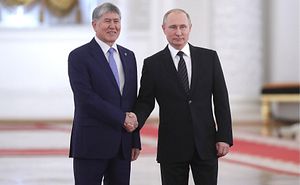Kyrgyz President Almazbek Atambayev, entering the final few months of his presidency, made a five-day trip to Russia last week. Starting in Moscow on June 19, Atambayev met with numerous Russian officials before visiting other regions on his way back south, including Bashkortostan and the Republic of Tatarstan. Throughout the trip, Atambayev lavished Russia with praise.
Following talks with Russian President Vladimir Putin on June 20, Atambayev said, “I cannot imagine the future of Kyrgyzstan without Russia.”
In those remarks, made at a state dinner, Atambayev waxed poetic about his disagreements with Putin:
I can probably admit today that during all these years I often argued with Mr Putin, and not only about work. However, sometimes we simply discussed historical matters…
I remember once we went so far… Baikal, Yenisei, Saratov, Siberia. Mr Putin said, “I see these are all Kyrgyz names, Kyrgyz words, but just do not ask to have them back.”
Atambayev continued, sweeping his historical and linguistic debates with Putin aside and fronting a vigorous defense of Russia. He commented that “many nations” understand that Russia is the “center of friendship, a country that brings only positive, bright things no matter how hard some forces in the world may try to demonize it.” He went on, claiming that Putin “has never tried to do anything bad for any country.” Atambayev urged “those who make accusations against Russia” or Putin to examine their own actions: “If they looked in the mirror, they would see who is really escalating tensions in the world.”
It’s a safe bet Atambayev means the United States, with which the Kyrgyz president has his own issues. In March, while railing at the media, Atambayev said he hoped to travel to the United States in September and take up the issue of RFE/RL directly with President Donald Trump (two months later, the Kyrgyz government dropped its lawsuits against RFE/RL‘s Kyrgyz buraeu). It’s not clear if the U.S. trip will actually happen. Kyrgyzstan’s presidential election — in which Atambayev legally cannot run — is scheduled for October 15.
One of the more surprising highlights of the trip was revived talk of a second Russian base in Kyrgyzstan. On June 24 while in Kazan, Atambayev told reporters that he had discussed Russia opening a base in southern Kyrgyzstan, rather than expanding its presence at Kant. According to RFE/RL, Atambayev asked, rhetorically, “What does Bishkek need to be protected from?… What we see in Afghanistan is the Taliban getting stronger there, and IS [Islamic State] is also gaining strength there.” Joshua Kucera, for EurasiaNet, noted that the idea is not without support, particularly with regard to its potential importance for the CSTO, but that the issue turns back on Bishkek’s need to strengthen its own forces rather than just host Russians.
Only in December, Atambayev was explaining during a press conference that eventually, the Russians would leave. “In the future, Kyrgyzstan should rely only on its own forces,” he said. As EurasiaNet noted at the time, Atambayev has made similar comments in the past. Base politics remain one of the most contentious issues in Kyrgyzstan. The Russian lease to Kant currently extends to 2027; the United States left the base at Manas airport in June 2014.
The subject of a southern base wasn’t mentioned in any of Atambayev’s or Putin’s mutual remarks, though Putin did say that the two had “reaffirmed our shared understanding that the presence of a Russian military base in Kyrgyzstan is an important factor of stability and security in Central Asia in keeping with the long-term interests of our countries and our CSTO allies.”

































